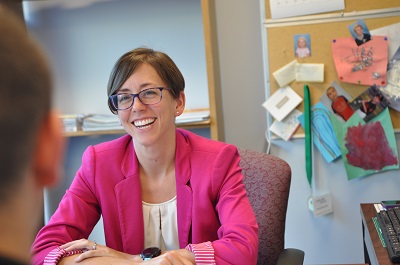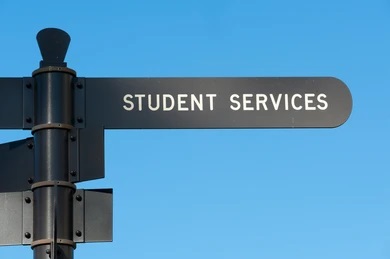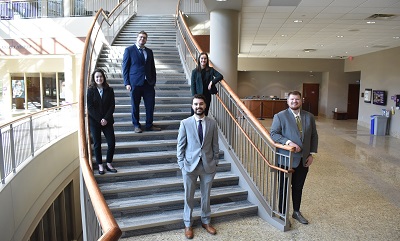By: Sarah Dylag Beznoska, Assistant Dean for Student and Career Services,
Cleveland-Marshall College of Law, Cleveland State University
It’s a regular day in the Office of Student and Career Services at Cleveland-Marshall College of Law. My day starts by meeting with a second-year student who is in tears because they did not receive any offers from our recent on-campus interview program. After reminding them that on-campus interviews are a very small segment of the legal market, I ask more questions than I answer: why they applied to the large law firms participating in on-campus interviews? Whether it is consistent with the conversations we had last year? What is their interest, if any, in public service? How they felt during the interviews? And what next steps they might take that are consistent with their strengths and values?
At noon, I moderate a panel discussion of site supervisors from our externship program, who talk about the learning opportunities available through the program. We focus on the skills that students develop on-site and the ways that the opportunities prepare students for employment goals. Throughout the program, I remind students about the deadlines for the program’s application process, noting that I understand they are busy, but I won’t waive the deadlines. If they are having trouble meeting deadlines, which is an essential lawyering skill, they can meet with a member of my team to talk about calendaring and time management.
After the panel, while eating lunch, I review a student’s cover letter for a new law clerk role. Knowing from conversations with the student that they have a lot more relevant experience than the cover letter demonstrates, I pull up their LinkedIn profile and send along some reflective questions to get them thinking about how they can leverage their past experience, even the non-legal experience, to demonstrate to this employer that they can do the work.
In the late afternoon, I meet with several first-year students, who are required to have an initial meeting with my office before the end of the semester. We cover everything from what brought them to law school to what experiences they have enjoyed most during their first semester to what steps they should be thinking about moving forward. We talk about graduation requirements, summer internships, and managing student debt, before I send them away with a Winter Break to-do list to advance their professional development.
As the day ends, I have a conversation with one of our third-year students, who has had a negative experience with a colleague in a student organization. We brainstorm some ways to address the issue, while remaining professional and consistent with their own values as a person. We also talk about taking some time for self-care and connecting with their personal support network to help process some strong emotions about the experience.
I close the day with an email from a recent graduate who has landed their first long-term post-graduate job. I congratulate them on success in what I know has been a long process, and I collect the ABA-required information for employment reporting before heading home.
This work—the day-to-day work I do in Student and Career Services, a combined department we launched in 2019 at Cleveland-Marshall—is built on some of the foundational premises of professional identity foundation. On a good day, I like to say that I help students, from day one, to assess and plan their entire law school experience with the goal of employability—coursework, student organizations and leadership, wellness support networks, externships, work experiences, and career outcomes. I meet students where they are at in their personal and professional development, and I talk with them about everything they are doing at the College of Law. Beyond that, I frequently hear about their personal life challenges, their families, their worries, and their successes. I hear students’ stories, I listen to their reflections on the experiences they are having in law school and the legal market, and I encourage them towards action items that move them along toward becoming the lawyers they want to be.
In other words, although we don’t do it all, we do a lot of professional identity formation in my office. In career services, we ask students to do self-assessment of their skills, strengths, and values during the fall semester of their first year. We offer practice area and industry panel presentations to allow students to explore the legal market. We help students to tell their own employability story through cover letters, resumes, and LinkedIn, in language that would resonate with legal employers. We support students on academic advising matters and the process of finding an experiential learning opportunity to fit their goals.
In student services, our focus is on developing responsible student leaders of our student organizations, empowering students to collaborate with their peers on events and programs, and developing wellness initiatives to create a culture of wellness and to help students embrace wellness as a part of their professional development.
It has been nothing but inspiring to see the professional identity formation (PIF) community embrace all of these things, and more, in developing implementation plans for the ABA’s professional identity standard. Inspiring to join a community of like-minded teachers and student-centered supporters, who are focused on helping students to build meaningful experiences towards successful outcomes. Inspiring to hear the creative ways that faculty engage students in PIF-related exercises and have conversations that don’t fit within the space of Student and Career Services. Inspiring to see institutional collaborations happening to benefit students.
So, when collaborating, don’t forget your staff departments! Engaging your talented staff team is as easy as reaching out to them to learn about their programs and offerings for students. Just ask! Build your PIF implementation plan to include Student and Career Services, to increase your employment outcomes for students, and to leverage all of the resources available in your institutions. I promise that your staff will be happy to hear from you!
If you have any questions or comments about this post, then please feel free to contact me at s.beznoska@csuohio.edu.

Sarah Dylag Beznoska is the Assistant Dean for Student and Career Services at Cleveland-Marshall College of Law at Cleveland State University.

